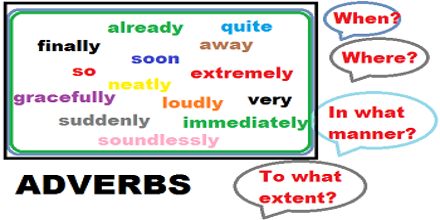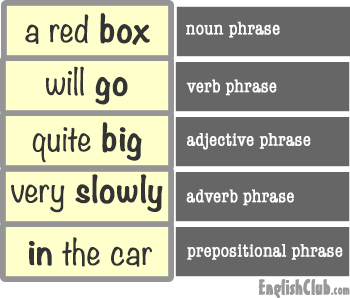EX: cheese , egg , notebook..
2. PRONOUN: These substitute for nouns but act in the same way. They can be
individual.
EX:they, who, which, she..
3.ADJECTIVE: These describe or modify nouns.
EX: slow, quiet, useful, blue, much

4. VERB: These state an action or a state of being. EX: kick, call, create, is, will be. Verbs can be transitive, meaning that they act on something else, or intransitive, meaning that they don't.
5.ADVERB: These modify several things: verbs, adjectives, or other adverbs.
Adverbs are often made from adjectives (careful -- carefully). They answer
these questions about an action: where? when? why? how? in what way? how much?
EX: tomorrow, next, quietly, honorably, very.


6. CONJUNCTION: These join words, phrases and clauses. There are three kinds of conjunctions:
1.Coordinating Conjunctions: these are single words that join words,
phrases, and clauses of equal grammatical importance in the sentence. EX: and, but, or, so.
2. Coorelative
Conjunctions: these are pairs of words that join
equally important words, phrases, and clauses. EX:
either...or, both...and, not only...but also.
3. Subordinating Conjunctions: these begin clauses that cannot stand on their
own and tell you how that clause relates to the rest of the sentence. EX (not a complete list): if, because, although, when, where, unless,
until, since.
7. PREPOSITIONS: These words or phrases relate nouns or pronouns to other words in a sentence, and often indicate some sort of positional relationship. EX: of, in, about, to, around, next to, on top of.
8. PHRASE: a
group of related words that does not have a subject, or does not have a
predicate, or both. A phrase acts collectively as a single part of speech,
and is usually a noun, adject or adverb. EX: Noun phrase: The winningest football team is at Greenville High. Adjective phrase: I
went down the street with a smile on my face. Adverb phrase: I went
down the street more slowly than I ever had before.
1.Prepositional
Phrases: prepositions and their objects and modifiers. EX:
That book is on top of the bookcase. Alice went through the looking
glass.
2. Verbal
Phrases: A verbal is a form of a verb that doesn't
act as a verb. This is not as confusing as it sounds; we all know that infinitive
forms of verbs (to go, to be) do not function as verbs in that form. Phrases
that include verbals are gerund phrases, participial phrases, and infinitive
phrases.
3. Infinitive
phrases: these can function as nouns, adjectives
or adverbs. Their verbals are always infinitive forms. EX: I have
lost the chance to say I am sorry. To
be a good friend is my goal.



:max_bytes(150000):strip_icc()/Verbs-58d8902c5f9b584683d72abc.jpg)


